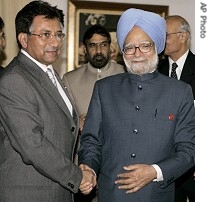2006年VOA标准英语-India, Pakistan Agree to Join Forces Against Te(在线收听)
By Patricia Nunan
New Delhi
18 September 2006
India and Pakistan have agreed to resume their interrupted peace process and to cooperate on the fight against terrorism. But remarks by Indian's prime minister suggest that New Delhi is still uncertain about Islamabad's relationship to Muslim terrorists in Kashmir - the central issue dividing the two neighbors. VOA's Patricia Nunan reports from New Delhi.
-------
 India's Prime Minister Manmohan Singh, right, and Pakistan's President Pervez Musharraf shake hands in Havana, Cuba |
||
But Mr. Singh says Pakistan must make good on its commitment to stamp out terrorism. "I do think that it is a new beginning. I hope it works," he said. "It is quite obvious to Pakistan that things cannot be business as usual, if terrorism is not under control or if the government of Pakistan is seen not to be willing to control terrorism."
Mr. Singh spoke on Indian television while returning to the Indian capital Monday from the Non-Aligned Movement summit in Cuba, where he met with Pakistani President Pervez Musharraf.
The two leaders agreed to resume their peace process and collaborate in fighting terrorism. The process stalled after nearly 200 people were killed in coordinated bombings on trains in the Indian city of Mumbai in July.
India blames Pakistan for allowing militants based there to cross into India to carry out terrorist attacks like the Mumbai bombings. Pakistan denies allegations that it sponsors terror attacks against India.
So far, neither nation has provided details of what are described as "joint mechanisms" to fight terrorism. But efforts are likely to focus on the disputed border region of Kashmir.
India controls about two-thirds of Kashmir, and the rest is held by Pakistan. The predominantly Muslim region is home to several Islamic militant groups who want India out of Kashmir, so that it may become independent or merge with Pakistan.
The dispute over Kashmir has led to two wars between India and Pakistan since it was divided between them in 1947, with the end of British colonial rule in the region.
Despite Mr. Singh's cautious optimism, analysts say it may prove difficult to convince some in India that Pakistan is actually willing to stop cross-border attacks.
Ajay Sahni, with the New Delhi-based Institute of Conflict Management, said Pakistan has little interest in stopping terrorism. He points to on-going violence in another of Pakistan's neighbors, Afghanistan, as evidence.
"Supposedly they are fighting the war against terrorism, but they have facilitated the Taleban in virtually reconquering half of Afghanistan," said Sahni. "And I don't expect Pakistan to act in any better faith as far as India is concerned. They will carry on terrorism as they use the 'fig leaf' of the joint mechanism to argue in front of the international community that they are trying to work toward peace."
Pakistan also denies allegations it supports militants fighting in Afghanistan, and points out that it has deployed 80,000 troops to its tribal border areas to root out insurgents.